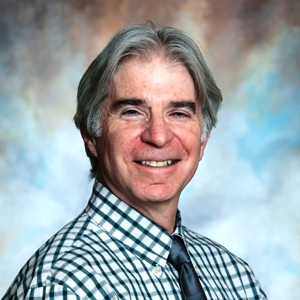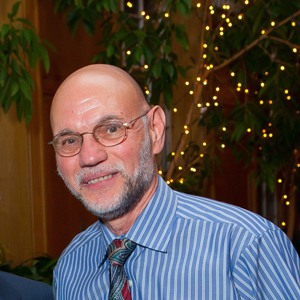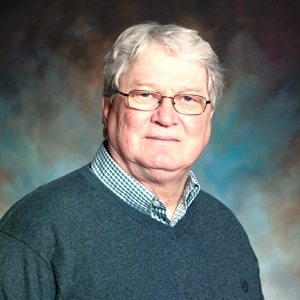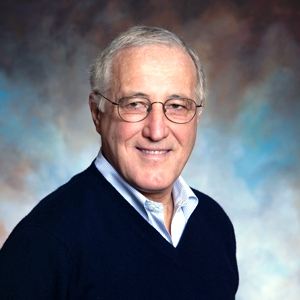Retiring faculty members Robert Cohn, Philip and Muriel Berman Professor of Jewish Studies in the Department of Religious Studies and chair of the Jewish Studies program; John Greco, professor of electrical and computer engineering; David Johnson, professor of English; and Julio Piazza, instructor of athletics, have been elected to emeritus status and were recognized for their service to Lafayette at the annual pre-Commencement reception, dinner, and awards ceremony. President Alison Byerly read the following citations.
Read more about the retiring faculty members
Read more about Commencement
ROBERT L. COHN

Robert Cohn
The Religious Studies Department without Bob Cohn? Impossible! A steadfast colleague for 27 years, Bob has been described as the department’s elder statesman, wise counsel, and trusted friend. As for Bob’s unassuming sense of humor? Who hasn’t heard the one about the Pope and Bill Clinton, or the Rabbi, the Priest, and the Minister? You’ll have to ask Bob to furnish the punch lines.
But seriously, Bob has taught a variety of courses including his always popular Jewish Humor and Love & Sex in Biblical Texts. Bob led students on interim courses through Poland and Russia; from Munich to Herculaneum; and across Greece and Rome. As the Philip and Muriel Berman Professor of Jewish Studies, he also teaches Jewish studies classes at Lehigh University. Professor Cohn has received the Thomas Roy and Lura Forrest Jones Award and Thomas Roy and Lura Forrest Jones Lecturer Award.
As a scholar, Bob is currently studying the revival of the memory of Jews in Poland and Jewish memory of Poland. For Bob, pillaged, abandoned, or recycled synagogues and cemeteries throughout Poland stand as “stony survivors” that contribute to a new national memory of Jews in Poland’s past and present. Ironically, this interest was the result of Bob’s 1993 invitation to be the first American Jewish Biblical scholar to teach in Roman Catholic seminars in Poland.
A warm, welcoming, and reassuring presence, Bob’s colleagues describe him as a great entertainer and chef, a valuable mentor, and a good listener who offers gentle guidance and (to quote a colleague) “bags of candy and dangerous toys to my children.”
And so what is in Bob’s immediate future? A bi-coastal retirement: relaxing in Santa Barbara—and Markle Hall. The Religious Studies Department without Bob Cohn? Impossible. The Provost’s Office with Bob Cohn? Priceless!
JOHN F. GRECO

John Greco
John Greco joined the Department of Electrical Engineering (as it was then known) in 1977. But John was actually offered a position at Lafayette twice. After completing his Ph.D. at the City University of New York in 1974, he turned down an offer to join Lafayette and instead joined the University of Petroleum and Minerals, in Dharan, Saudi Arabia. Upon returning to the United States three years later, he was offered a position at Lafayette for the second time. This time he accepted—and stayed for the next 37 years.
During his tenure at Lafayette John taught a wide range of courses and led study abroad groups in Brussels. However, he was best known for his introductory courses in Digital Circuit Design. Students appreciated his dedication to their learning, his ability to help them debug the most intractable design problems in the lab, and his creative use of PowerPoint effects in lectures. He received both the Marquis Distinguished Teaching Award and the B. Vincent Viscomi Engineering Prize for Excellence in Mentoring and Teaching.
An avid reader of The New York Times, John once saw a picture of students from the Lafayette Investment Club visiting Wall Street. Missing from that picture, however, was a student who had used the trip as an excuse to miss John’s class! John enjoyed his triumph as an investigative reporter that day.
John’s department colleagues miss his easygoing nature, his willingness to help with department matters, his knowledge of department and College history, and his ability to read obsolete floppy disks no matter the age or format. Colleagues outside the department remember his reliable and level-headed committee service and his fiercely competitive squash games in the gym. Good luck John—and good luck to anyone he plays!
DAVID R. JOHNSON

David Johnson
David Johnson’s life before Lafayette included work as a high school teacher and a realtor. We might guess that as a school teacher, he learned to be skeptical about excuses and that as a realtor he learned how to induce compromise. However he got his leadership skills, David’s added negotiating, which he used to his advantage during his stints as English Department head, committee chair, and, notoriously, associate provost. While some might have described David’s leadership style as genial, others as formidable, he preferred to see himself as curmudgeonly—naively thinking this might deter faculty from his door!
David has taught a range of courses on the American novel and short story, regional studies, and literary form and meaning. He twice co-led Moveable Feasts—a creative romp, er, interim course through the Paris of Hemingway and other literary expatriates. David received a Thomas Roy and Lura Forrest Jones Lecturer Award, the Christian R. and Mary F. Lindback Award, and a Marquis Distinguished Teaching Award.
David’s recent years as a scholar were devoted to his biography of Conrad Richter, the Pennsylvania writer, who spent many years in New Mexico. As literary executor for both Conrad and his daughter, David had the “onerous” task of residing at the family home in Albuquerque, exploring reams of professional and personal documents—and occasionally, his favorite pueblo city of Acoma.
Department colleagues described David as being at the forefront of some of Lafayette’s most significant and compelling initiatives—from a new College curriculum to issues of diversity. Always a supporter of the theater program, David himself was active in the faculty plays of yore, as both an actor and a producer. As this was before my time at the College, perhaps we could cajole him into reprising a performance for us some day. What do you say David?
JULIO PIAZZA

Julio Piazza
Everyone knows that for 27 years Julio Piazza played a prominent role in the proud history of athletics at Lafayette College. But everyone doesn’t know that Julio was born in Italy, emigrated to Canada and then to the United States. Before becoming “Coach Piazza,” Julio’s running journey began at the University of Pennsylvania where he was an eight-time All-Ivy middle distance runner and where two of his relay records still stand. Another little known fact: After graduating from Penn, Julio tried out for the Italian Olympic track and field team! While he didn’t make that team, he did go on to be named Patriot League Coach of the Year in either track & field or cross-country on eight occasions!
During his career at Lafayette, Julio coached hundreds of student-athletes, many of whom were Patriot League champions and school record-holders, and he led our women’s and men’s track & field and cross-country teams to numerous championships and school records. In fact, more than 80 percent of the school records fell during his tenure and, of special note, his teams won more than 60 percent of their meets against arch-rival Lehigh!
While winning is important to us all, it is not the only thing we, or Julio, are about. Some years back, Julio inspired the members of his track team to support Education and Hope, a nonprofit foundation fostering education among impoverished children and youths in Guatemala’s western highlands.
The recipient of the Annual Maroon Club Athletic Staff Achievement Award, Julio’s dedication has had a positive impact on the lives of countless students on College Hill and beyond. As he recently reminisced about coaching, “The best part of every day was coming down to practice and being with the kids on the team.” I’m sure the best part of the kids’ day was being with you! Thank you, Julio.



